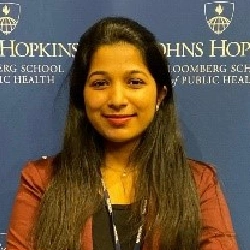
Snehal Ghodke
Johns Hopkins School of Public Health, USATitle: Association of Body Mass Index with Dental Caries among Children in Tribal School of Shantivan, Nere, Maharashtra
Abstract
The objective of this study was to investigate the relationship between dental caries prevalence and body mass index (BMI) among tribal schoolchildren aged 6–16 in Shantivan, Raigad district, Maharashtra, India. We conducted an observational study in 384 school children, assessing their dental caries and BMI through survey-based forms using the World Health Organization (WHO) Oral Health Assessment Form for Children, 2013.
Our analysis revealed that among the 384 subjects, 45.6% were male and 54.4% were female, with a mean age of 11.38 ± 2.97 years. While we found no significant association between decayed, missing, and filled permanent teeth (DMFT) and BMI (p > 0.05), a significant correlation was observed between decayed, missing, and filled deciduous teeth (dmft) and BMI (p < 0.05). Underweight and female gender are risk factors with significant values to develop dental caries in deciduous and permanent dentition, respectively.
Our findings suggest a higher prevalence of dental caries among tribal children of this population. Notably, dental caries was more prevalent among underweight tribal children, with severity directly proportional to their underweight condition. These results underscore the elevated risk of dental caries associated with low BMI.
The clinical significance of our study lies in the potential for nutritional status assessment to guide targeted interventions aimed at preventing dental caries in children with low BMI or malnourishment. By focusing on nutrition's impact on oral health, clinicians can develop more comprehensive oral healthcare plans tailored to the needs of vulnerable populations.
Biography
Snehal Ghodke is a Dentist and Public health professional. She completed her MPH from Johns Hopkins School of Public Health, USA and currently works as a Research Associate at the International center for maternal and newborn health within the Department of International Health, Johns Hopkins school of Public Health. In this role, she helps facilitate field research activities, contributes to capacity building efforts, and supports the implementation of research projects aimed at improving maternal and child health outcomes in low- and middle-income countries. Snehal has received recognition for her academic achievements and research contributions, including awards for her presentations at scientific conferences and publications in peer-reviewed journals. She is passionate about implementing research skills at a global level.

.png)